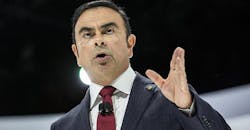Ghosn Arrested in Japan, Threatening Three-Way Alliance
The cult of Carlos Ghosn collapsed on Nov. 19 as the boss of Renault SA and Nissan Motor Co. was arrested in Tokyo for alleged financial crimes, likely ending his tenure at the Japanese automaker.
Ghosn, who’s widely credited with saving Nissan from failure and bringing it together with Renault and Mitsubishi Motors Corp., was detained over a suspected breach of Japanese financial laws, according to Nissan CEO Hiroto Saikawa. Ghosn and Director Greg Kelly have been under investigation at Nissan for several months after a whistleblower complaint, and the board is set to meet Thursday to remove them both.
The two underreported their compensation to securities regulators in Tokyo, Nissan said. And the automaker said it had uncovered “numerous other significant acts of misconduct” by Ghosn. These include “personal use of company assets -- and Kelly’s deep involvement has also been confirmed,” Nissan said in a statement.
Mitsubishi, where the 64-year-old Ghosn also serves as chairman, said it will also investigate his conduct and evaluate whether he should lose that position. Renault’s board was meeting late Monday, and French Finance Minister Bruno Le Maire told reporters he’s working with all sides to maintain stability.
The bombshell allegations cast doubt over the future of the alliance, a three-way tie-up that Ghosn has sought to strengthen as the industry grapples with the shift toward electric and self-driving cars and challenges from newcomers such as Uber Technologies Inc. and Tesla Inc. The news rattled European markets, with shares of Renault falling as much as 15% in Paris, while Nissan’s global depository receipts sank more than 11%.
In a news conference at Nissan headquarters in Yokohama, Saikawa expressed disappointment, indignation, and despair at Ghosn’s conduct, which included using company funds for personal investments and misusing corporate assets. Saikawa didn’t give any details, but news agency Kyodo reported that Ghosn may have understated his income by 5 billion yen (US$44 million) over five years.
“This is an act that cannot be tolerated by the company,” Saikawa said. “It is sufficient grounds for his dismissal.”
Saikawa repeatedly questioned Ghosn’s legacy and the conventional narrative of Nissan’s turnaround, stressing that it had been due to the work of many employees and their families, and not the heroic efforts of any individual.
If Davos Were a Person, It Would Be Carlos Ghosn
A concentration of power in the hands of one person set the stage for the misconduct, Saikawa said, and Nissan lacked the transparency needed to detect it. In the future, he said, the company will look for a sustainable structure that doesn’t rely on one person.
Though he’s no longer Nissan’s CEO, as chairman Ghosn had been laying the groundwork to make the alliance permanent after his departure. In September, Ghosn said he planned to pare back his role at the three automakers while continuing to head their alliance.
“Investors need to be reassured,” as Ghosn is a key driver of the collaboration, Jose M. Asumendi, an analyst with JPMorgan, said in a research note. Cooperation with Nissan “is critical to Renault’s strategy going forward.”
Nissan said it has been providing information to Japanese officials and is cooperating fully with the probe. Ghosn went voluntarily with investigators, the Asahi newspaper reported. It’s unclear where he is now and how long the legal process will take. The Tokyo prosecutors’ office and Renault declined to comment. Ghosn couldn’t be reached for comment.
Among the best-paid executives in both Japan and France, Ghosn has regularly drawn criticism for his compensation. Ghosn receives numerous paychecks in his roles as chairman of the Renault-Nissan-Mitsubishi alliance, CEO of Renault, and chairman of both Nissan and Mitsubishi.
At Nissan, he was paid about 1.1 billion yen ($10 million) for 2016 and about $6.5 million in the most recent fiscal year. He took home about $8.5 million at Renault and about $2 million from Mitsubishi in the latest period. At Renault, his package for 2017 was narrowly passed by Renault shareholders, but only after he agreed a 20% reduction. France owns about 15 percent of Renault and supported Ghosn’s contract renewal.
Ghosn has been contemplating his next career step as the companies look to change the pact’s structure, possibly through a merger. Ghosn gave up his role as CEO of Nissan last year and has said that he may step down as CEO of Renault before his four-year term ends in 2022. The carmakers have given themselves two years to decide on a possible merger or an alternative mechanism to enhance their partnership, Bloomberg reported in July.
A Brazilian-born French national, Ghosn revived Renault as executive vice president from 1996 to 1999. He then was assigned to turn around Nissan, where he reduced the company’s purchasing costs, shut factories, eliminated 21,000 jobs and invested the savings back into 22 car and truck models in three years.
The latest developments add to a string of crises in the Japanese auto industry, from scandals involving product quality to falsification of records. Nissan found itself in the midst of a controversy last year, when Japan’s regulators discovered uncertified inspectors were approving vehicles, leading to a recall of more than 1.2 million cars.
By Ma Jie and Ania Nussbaum
About the Author
Bloomberg
Licensed content from Bloomberg, copyright 2016.
